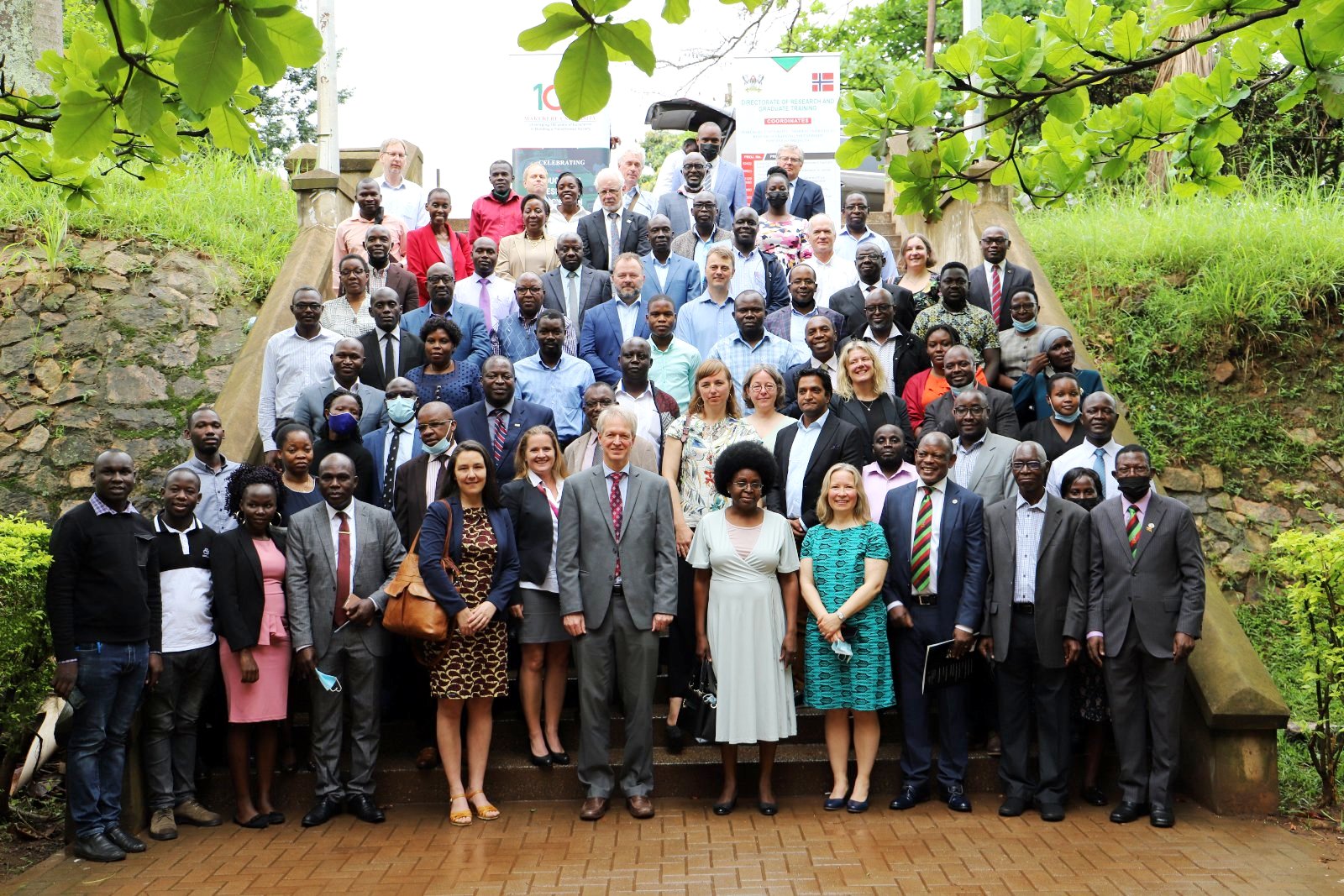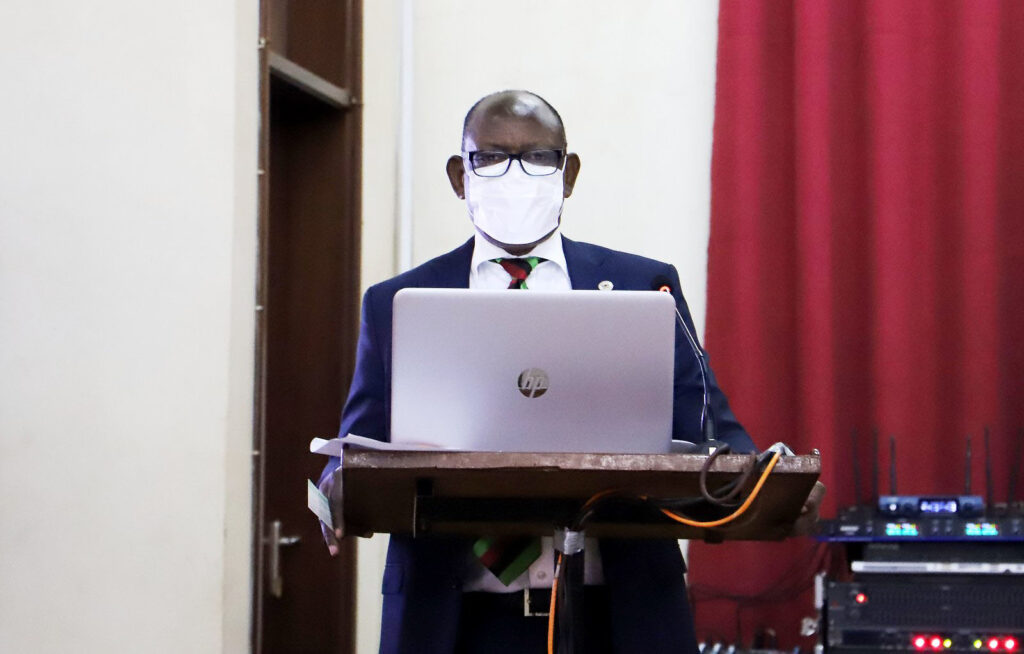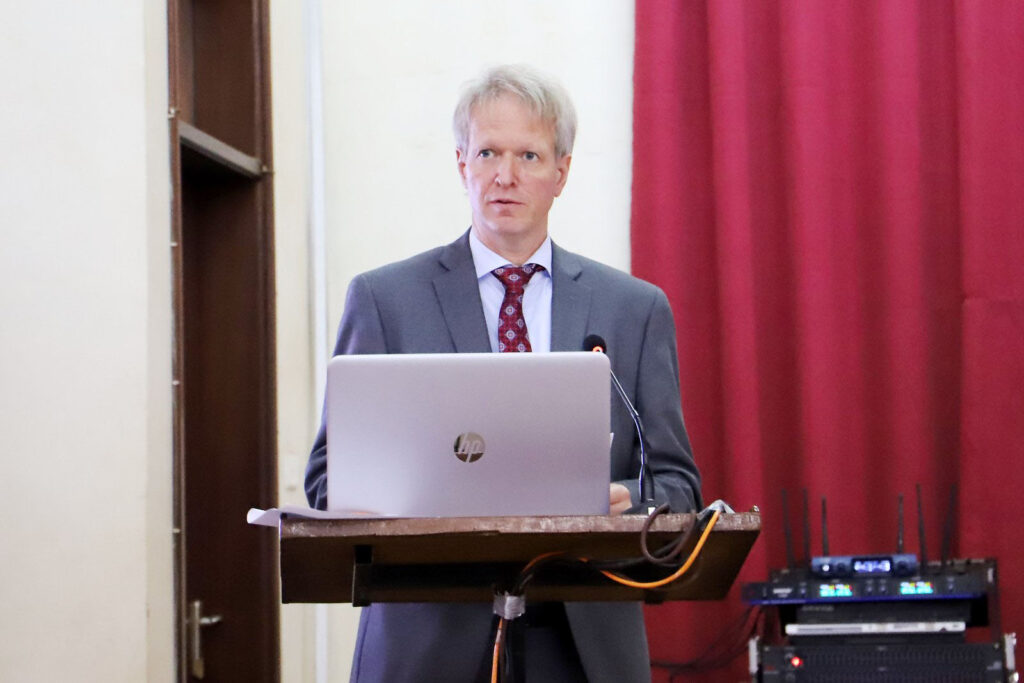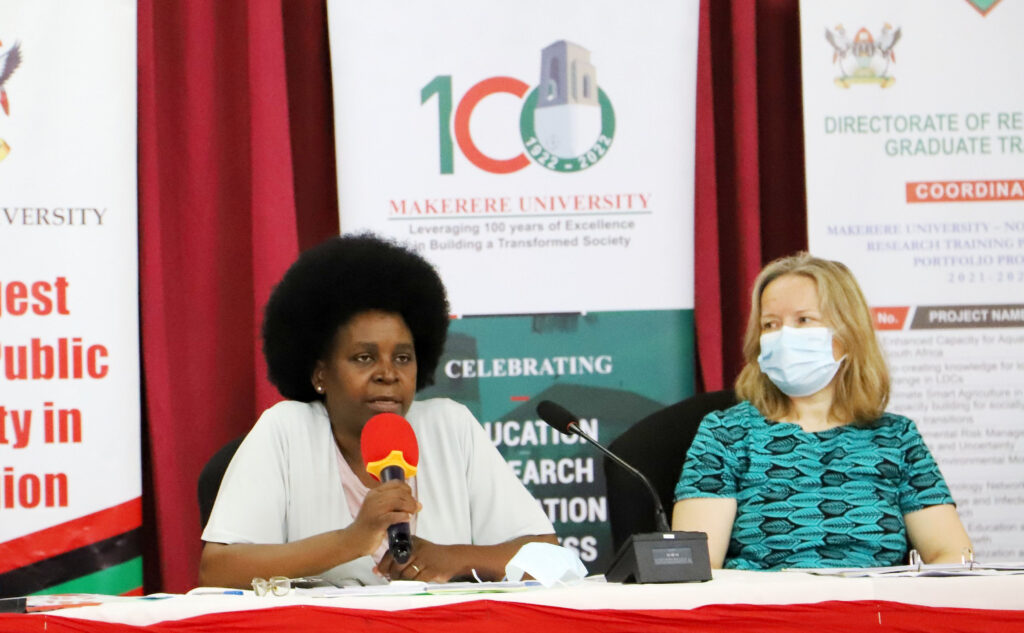General
Hon. Dr. Musenero Launches NORHED Week, Calls for Industry-Impacting Research
Published
4 years agoon

The Minister of Science, Technology and Innovation (MoSTI), Hon. Dr. Monica Musenero on Monday 25th April, 2022 presided over the opening ceremony of the NORHED Week in Uganda and rallied researchers to ensure that their findings flow beyond academia into communities. She noted that the value chain approach adopted by the National Science, Technology and Innovation agenda necessitates that research produces industry-ready prototypes that feed into commercialisation and subsequently, the market. She prayed that this agenda would be at the back of researchers’ and funders’ minds as they embark on the next phase of projects.
Set to be held from 25th to 29th April 2022, the Week will create a platform for researchers who won grants under NORHED II to meet and share experiences as well as discuss possible links and synergies across projects. Furthermore, the Week will create a platform for researchers to discuss how NORHED can contribute to strengthening higher education and research in Uganda. NORHED is the Norwegian Programme for Capacity Development in Higher Education and Research for Development.
In his welcome remarks, the day’s Moderator, NORHED Coordinator and Director, Directorate of Research and Graduate Training (DRGT), Prof. Buyinza Mukadasi noted that Makerere University is participating in 19 of Uganda’s 21 NORHED II projects, a proportion he described as the “lion’s share”. A total of 60 projects were awarded globally under NORHED II funding, set to run from 2021 to 2026.
“We have enjoyed a mutually beneficial cooperation and now have ample evidence that Norway invests in knowledge and competence building and prides itself in the knowledge society with ability to create and make practical use of the new scientific discoveries.
“This is a shared vision at Makerere and we are committed to continue playing this important role because we believe the knowledge economy is the way to go. It is heartwarming to see that Makerere is contributing enormously to the National Development Plan through research output, dissemination and outreach activities” remarked Prof. Buyinza.

The Vice Chancellor, Prof. Barnabas Nawangwe in his remarks shared that all 19 projects that Makerere is participating in are designed to address multidisciplinary themes, steered by the University Strategic Plan 2020-2030. “Indeed, strategic investment in research lays the foundation for development of any country’s intellectual strategies, competent workforce, progressive leaders, gender equality and human rights.”
Prof. Nawangwe added that NORAD; the Norwegian Agency for Development Cooperation, and other development partners have played a fundamental role in augmenting Internally Generated Funds at Makerere University, which has helped to substantially tackle the shortage of funds for research and infrastructural development.
“Makerere now has one of the best research management infrastructures on the African continent largely due to the support of the Norwegian Government” he added.
The Vice Chancellor thanked the Norwegian Government for enhancing Makerere‘s capacity to train PhDs locally, which has drastically reduced the number of staff trained entirely in Norway or on sandwich programmes.
“Out of the 100 PhDs, 85 are locally trained and only 15 staff members will go on sandwich training, which would not have been possible 30 years ago. When we started, almost all the students had to go to Norway” added Prof. Nawangwe.
Addressing participants, the Head of Delegation, Ms. Solbjørg Sjøveian said that NORHED is not only about strengthening Universities but the long-term effects that this capacity building has on societies. She added that NORHED seeks to build equitable partnerships for mutual learning and knowledge sharing with a strong South-South component, that enables younger less-established universities to learn from their more-established peers.
“One example is Makerere University which has taken a regional role in contributing to strengthening other universities both in Uganda and neighbouring countries like South Sudan” said Ms. Sjøveian. “Makerere is an important partner for Norad. As an institution you have strong commitment and dedication by both individual researchers as well as at unit level” she added.
The Head of Delegation therefore paid tribute to this pivotal role played by Makerere University in the region, especially as the institution celebrates her centenary anniversary.

Echoing the Head of Delegation’s pivotal role remark, Arne Haug the Minister Counsellor and Deputy Head of Mission at the Royal Norwegian Embassy in Uganda who represented the Ambassador H.E. Elin Østebø Johansen emphasised that it is important to strengthen the research capacity at Makerere University.
“Makerere is the leading institution in Uganda and therefore provides the largest number of human resources to other universities. Norway’s support has therefore not just focused on Makerere but it has evolved and responded to the ever changing needs in Higher Education in Uganda” remarked Mr. Haug.
He took note of the; School of Forestry, Environmental and Geographical Sciences, School of Food Technology, Nutrition and Bio-Engineering, School of Women and Gender Studies, School of Computing and Informatics Technology buildings as well as furnishing of the Main Library Extension as some of the physical infrastructure that had been built with support from Norway on Makerere‘s “beautiful” Main Campus. The Vice Chancellor later brought to light that the College of Engineering, Design, Art and Technology (CEDAT) Extension was the last and largest infrastructural undertaking by the Norwegian Government at the Main Campus.
Prior to declaring the NORHED Week open, Hon. Dr. Monica Musenero, a self-confessed student of Vision 2040 and its constituent National Development Plans (NDPs), thanked the Norwegian Government and other development partners for laying the foundation upon which Higher Education would contribute to the attainment of Uganda’s development objectives.
Hon. Dr. Musenero shared that whereas NDP I (2010/11-2014/15) had been aimed at “addressing the fundamentals”, NDP II (2015/16-2019/20) focused on “putting up basic infrastructures”. Turning to the current NDP III (2020/21-2024/24), she shared that a decision had been taken to introduce a new institutional framework with a shift from sector to programme implementation. This shift, it is envisaged will enable Uganda to put to use the baseline human resource that had been trained and infrastructure that has been put in place to take off on the industrialisation tangent.

“Over these past years and with the support of partners like Norway and many other agencies, we have worked on a number of things such as the development of human resource. I was one of the first people who were sent out on a programme from Makerere called Agricultural Research and Training Project (ARTP) in 1994.
“And we really appreciate the support of our partners. We started by taking people abroad because we didn’t have any capacity and then we moved to sandwich programmes and now as I have been informed, we are shifting to developing people on the ground” acknowledged the Honourable Minister.
Turning back to the current phase of development under NDP III, Hon. Dr. Musenero invited the delegation from NORHED and other partners to move in step with the National strategy that seeks to promote research that results into products. The shift to product-centric research, she noted, would inspire the growth of industries that would in turn create the jobs, and eventually the environment that sustains the welfare of the youth.
“Our focus in NDP III is to invite and request all the partners to see how we can now tackle the issue of employment, and science and technology has been given the pivotal role, because if we do not translate these computer laboratories and infrastructure into jobs, we shall still have the problem and cheat the leaders of the future” remarked Hon. Dr. Musenero.
The official opening was followed by a Keynote address on “Digitalization and gender inclusiveness in teaching, research and administration in Uganda-Post Covid-19 era” by Dr. Ruth Nsibirano, and discussion led by Dr. Dorothy Okello. This was followed by the second keynote address by Dr. Vincent Ssembatya on “PhD training as a pillar in Uganda’s Economic and Sustainable Development”, which was discussed by Prof. John David Kabasa.
The NORHED Week itinerary prepared by a team led by Assoc. Prof. John Mango, will feature presentations by projects categorised according to sessions on Education and Health (5 projects), Humanities and Social Sciences (6 projects) as well as Climate Change, Natural Resources and Energy (10 projects). On Wednesday 27th April, the Delegation will meet Members of Makerere University Management, visit selected NORHED-II project Research Labs/Research Sites and on Thursday 28th April, visit Makerere University Business School (MUBS). The delegation will crown the week by meeting the Uganda National Council for Science and Technology on Friday 29th April 2022.
You may like
-


Over 9,200 to graduate at Makerere University’s 76th Graduation
-


Meet Najjuka Whitney, The Girl Who Missed Law and Found Her Voice
-


Makerere University School of Public Health Graduates First Cohort of Cost-Effectiveness Analysis Short Course
-


Climate variability found to shape malaria trends in Yumbe District
-


Mak hosts First African Symposium on Natural Capital Accounting and Climate-Sensitive Macroeconomic Modelling
-


Uganda Martyrs Namugongo Students Turn Organic Waste into Soap in an Innovative School Project on Sustainable Waste Management
General
Over 9,200 to graduate at Makerere University’s 76th Graduation
Published
4 hours agoon
February 24, 2026
Pomp and colour defined the opening day of the Makerere University’s 76th Graduation Ceremony as thousands gathered to celebrate academic excellence and new beginnings.
The historic ceremony has brought together scholars, families, friends and industry partners in a vibrant celebration of achievement and possibility. Throughout the four-day event, the University will confer degrees and award diplomas to 9,295 graduands in recognition of their dedication and hard work.
Among the graduates, 213 will receive Doctor of Philosophy (PhD) degrees, 2,503 will graduate with Master’s degrees, and 6,343 will earn Bachelor’s degrees. In addition, 206 students will graduate with postgraduate diplomas, while 30 will be awarded undergraduate diplomas.
Of the total number of graduands, 4,262 are female and 5,033 are male. According to Vice Chancellor, this marks the first time in 15 years that male graduands have outnumbered their female counterparts.
The best overall graduand in the Sciences, Esther Ziribaggwa, graduated on the opening day with the Bachelor of Agricultural and Rural Innovation and an impressive Cumulative Grade Point Average (CGPA) of 4.77.

The ceremony marks a proud moment for Makerere University as it continues to nurture top-tier professionals across diverse fields.
While presiding over the graduation, the State Minister for Primary Education, Hon. Dr. Joyce Moriku Kaducu, on behalf of the First Lady and Minister of Education and Sports, Hon. Janet Kataaha Museveni, pointed out that Makerere University is a model institution, where leaders are nurtured, scholars are sharpened, and where dreams have been given direction.
In her address, Hon. Museveni, highlighted Government’s deliberate investment in research, innovation, and infrastructure to strengthen higher education in Uganda.
“The establishment of the Makerere University Research and Innovation Fund (RIF), supports high-impact research and innovation that directly contributes to national priorities and development. Through this initiative, thousands of researchers and innovators have pursued practical, scalable solutions that are transforming communities and key sectors across Uganda,” Mrs Museveni, said.
The Minister also noted that Parliament’s approved a USD 162 million concessional loan to upgrade science, technology, and innovation infrastructure at Makerere University. The funding will facilitate the construction of modern laboratories, smart classrooms, and state-of-the-art facilities for Engineering and Health Sciences, investments expected to position the University firmly within the Fourth Industrial Revolution.
“Government has embarked on the construction of a National Stadium at Makerere University and other institutions of higher learning across the country. This will promote physical education, strengthen talent identification, and boost investment in the sports sector,”

Turning to the graduands, the Minister encouraged them to see themselves not merely as job seekers, but as job creators and solution-makers.
Uganda and Africa need innovators who will modernize agriculture; engineers who will build quality infrastructure; healthcare professionals who will strengthen health systems; and educators who will inspire the next generation,” the Honourable Minister said.
She reminded graduates that they are entering a rapidly changing world shaped by Artificial Intelligence, climate change, and shifting global markets. To thrive, she advised them to remain adaptable, creative, and committed to lifelong learning.
She also encouraged graduates interested in entrepreneurship to tap into the Government’s Parish Development Model, which provides community-based financing and production support.
Quoting Proverbs 3:5–6, the Minister urged the graduates to trust in God as they embark on their next chapter.
She extended special appreciation to the Mastercard Foundation for its 13-year partnership with Makerere University in expanding access to education and empowering young people in Uganda and beyond.
In his speech, the Chancellor of Makerere University, Dr Crispus Kiyonga, urged graduands to harness research, innovation and technology to drive Uganda’s transformation.

“This is a milestone in your lives. You have invested time, discipline and hard work to attain these qualifications. It is important that you derive value from this achievement, not only for yourselves, but for your families and for society.” Dr Kiyonga, said.
Dr. Kiyonga expressed gratitude to the Government of Uganda for its continued financial support to the University, particularly the funding allocated under MakRIF, which he described as critical in strengthening the institution’s research capacity.
“Research plays a very vital role in the development of any community. Makerere as the oldest University in the country is doing a significant amount of research, However, more work is required to mobilize additional resources to further strengthen research at the University.” Dr Kiyonga, noted.
Acknowledging the challenges of a competitive job market, Dr. Kiyonga encouraged graduates to think beyond traditional employment pathways.
“It is true that the job market may not absorb all of you immediately. But the knowledge you have acquired is empowering. You can create work for yourselves, individually or in teams.” Dr Kiyonga, said.
He advised the graduands to embrace discipline, integrity and adaptability in the workplace, and to take advantage of technology and digital platforms to innovate and respond to societal challenges.
“Every development challenge presents an opportunity. Believe that you can apply your knowledge to create solutions with impact.” He said.
Addressing the congregation, the Vice Chancellor, Prof Barnabas Nawangwe, congratulated the graduands, particularly staff and societal leaders on their respective achievements.

“I congratulate all our graduands upon reaching this milestone. In a special way I congratulate the members of staff, Ministers, and Members of Parliament that are graduating today as well as children and spouses of members of staff,” Prof Nawangwe, said.
In his speech, Prof Nawangwe, recognized outstanding PhD students, particularly members of staff. who completed their PhDs in record time without even taking leave from their duties.
He called upon graduates not to despise humble beginnings but rather reflect on the immense opportunities around them and rise to the occasion as entrepreneurs.
“You are all graduating with disciplines that are needed by society. We have equipped you with the knowledge and skills that will make you employable or create your own businesses and employ others. Do not despair if you cannot find employment. Instead, reflect on the immense opportunities around you and rise to the occasion as an entrepreneur,” Prof Nawangwe, said.
Prof Nawangwe called upon the graduands of PhDs to use their degrees to transform the African continent.
“As you leave the gates of Makerere I urge you to put to good use the knowledge you have received from one of the best universities in the World to improve yourselves, your families, your communities, your Country and humanity. Let people see you and know that you are a Makerere alumnus because of the way you carry yourself in society with dignity and integrity. Put your trust in God and honour your parents and opportunities will be opened for you,” Prof Nawangwe, said.
Delivering a key note address, Prof. Nicholas Ozor, the Executive Director of the African Technology Policy Studies Network Nairobi, Kenya ((ATPS). Reminded the graduates that a degree is not a finish line but the beginning of accountability. “The world is a complex, fast changing and deeply unequal. Degrees make you responsible for others not better than them,” Prof Ozor, said.

The 76th Graduation Ceremony of Makerere University will be held from Tuesday 24th to Friday 27th February, 2026. A total of 213 PhDs (87 female, 126 male), 2,503 Masters (1,087 female, 1,416 male), 206 Postgraduate Diplomas (80 female, 126 male), 6,343 Undergraduate Degrees (2,999 female, 3,344 male), and 30 Undergraduate Diplomas (9 female, 21 male) will be graduating from all the Colleges.
Ms. Sarah Aloyo and Ms. Nakato Dorothy both students of the Bachelor of Procurement and Supply Chain Management emerged as the best in the Humanities and Best Overall students with a CGPA of 4.93. Mr. Ssewalu Abdul, a Bachelor of Leisure and Hospitality Management student emerged second best in the Humanities with a CGPA 4.90. Ms. Esther Ziribaggwa emerged as the best student in the Sciences with a CGPA of 4.77 in the Bachelor of Agricultural and Rural Innovation, while Mr. Simon Mungudit emerged second best in the Sciences with a CGPA of 4.76 in the Bachelor of Science in Petroleum Geoscience and Production.
Commencement Speakers
- Day 1 – Prof. Nicholas Ozor, the Executive Director of the African Technology Policy Studies Network, Nairobi, Kenya
- Day 2 – Prof. Dr. Maggie Kigozi, Chairperson Makerere University Endowment Fund Board
- Day 3 – Dr. Patricia Adongo Ojangole, Managing Director, Uganda Development Bank Limited
- Day 4 – Ms. Reeta Roy, Former President & Chief Executive Officer, Mastercard Foundation
The 76th Graduation Ceremony will be held at the Freedom Square following the schedule below:
Tuesday, 24th February, 2026
College of Agricultural and Environmental Sciences (CAES)
College of Computing and Information Sciences (CoCIS)
College of Education and External Studies (CEES)
School of Law (SoL)
Livestream Link for Day 1: https://youtube.com/live/wVGPA0FJ9pU
Wednesday, 25th February, 2026
College of Health Sciences (CHS)
College of Natural Sciences (CoNAS)
College of Veterinary Medicine, Animal Resources and Bio-security (CoVAB)
School of Public Health (SPH)
Thursday, 26th February, 2026
Makerere University Business School (MUBS)
College of Business and Management Sciences (CoBAMS)
Friday, 27th February, 2026
College of Engineering, Design, Art and Technology (CEDAT)
College of Humanities and Social Sciences (CHUSS)
Institute of Gender and Development Studies (IGDS)
Makerere Institute of Social Research (MISR)
General
Mak Selected to Host Alliance for African Partnership Africa Office
Published
1 day agoon
February 23, 2026
Makerere University has been selected to host the Africa Office of the Alliance for African Partnership (AAP). The significant milestone that underscores Makerere’s role in fostering research, innovation, and global collaborations across the continent was announced at a meeting of the University’s Central Management with an AAP delegation on 23rd February 2026.
Makerere’s selection was based on the University’s robust commitment, alignment with the AAP’s Strategic Plan, and proven ability to manage consortium activities. The AAP, which was initiated by Michigan State University (MSU) in collaboration with Ten African Universities and agricultural policy research networks in 2016, targets critical challenges in education, youth empowerment, health and nutrition, agri-food systems, science and technology, water, energy, environment, and culture and society.
Addressing the delegation consisting of AAP Co-Directors from MSU, Dr. Jose Jackson-Malete and Dr. Amy Jamison, accompanied by newly-appointed Director of the AAP Africa Office, Dr. Racheal Ddungu Mugabi and Ms. Clare Cheromoi, the Vice Chancellor, Prof. Barnabas Nawangwe who appreciated the choice of Makerere to host the Africa Office said:
“One of the greatest challenges facing African universities is PhD training, particularly supervisory capacity. Through partnerships such as the Alliance for African Partnership we can leverage international expertise to strengthen supervision—whether through training supervisors or through joint supervision arrangements.”
Prof. Nawangwe equally applauded joint initiatives such as the Grant Writing and Publication project, which gave rise to the establishment of a Writing Centre that he said can be used to build capacity in AAP member universities with Makerere as the hub. Officially launched on 21st March 2023, the project is living up to its expectation of becoming a springboard for strong postdoctoral collaborative research for both institutions and other US universities.
Dr. Titus Awokuse, Vice Provost and Dean for International Studies and Programs at Michigan State University (MSU) who attended virtually, reiterated that Makerere’s selection reflects its long-standing commitment to advancing African higher education, research excellence, and meaningful global collaboration.
Reflecting on the origins of the Alliance for African Partnerships (AAP), Dr. Awokuse explained that nearly a decade ago, MSU initiated a transformative conversation in Atlanta centered on the question: How should we partner differently? From this dialogue emerged AAP—an Africa-centered consortium that now brings together 12 institutions across Africa and the United States.

He emphasized that AAP is grounded in equity, mutual benefit, shared leadership, and deep respect for African priorities and expertise. Since its founding, MSU has served as convener and key supporter, working with member institutions to strengthen research collaboration, promote faculty and student engagement, and address shared development priorities.
Dr. Awokuse underscored that AAP’s success is the result of collective vision and commitment, not the efforts of a single institution. He paid tribute to Lilongwe University of Agriculture and Natural Resources for hosting the Africa Office in its early years and acknowledged the foundational leadership of the inaugural Africa Office Director.
He described the launch of the Africa Office at Makerere University as a significant milestone that reinforces Africa-led leadership, strengthens regional collaboration, and enhances responsiveness to emerging opportunities. MSU, he affirmed, remains fully committed to AAP and to working closely with Makerere and all consortium partners to expand collaborative research, nurture the next generation of scholars, and advance Africa-led solutions to global challenges.
The newly-appointed AAP Africa Office Director, Dr. Racheal Ddungu Mugabi is a member of faculty in the Department of Development Studies, Institute of Gender and Development Studies. Her work on intersectional inequalities in Uganda and other Global South regions uniquely positions her to drive collaborative research and partnerships at the Africa Office.
Initially founded by ten African Universities and MSU, AAP now comprises eleven African members including; the African Network of Agricultural Policy Institutes (ANAPRI)-Zambia, Egerton University-Kenya, Lilongwe University of Agriculture and Natural Resources (LUANAR)-Malawi, Makerere University-Uganda, United States International University-Africa-Kenya, Universite Cheikh Anta Diop-Senegal, Universite Yambo Ouologuem de Bamako-Mali, University of Botswana-Botswana, University of Dar es Salaam-Tanzania, University of Nigeria, Nsukka-Nigeria, and the latest, University of Pretoria-South Africa.
These Universites collaborate under Focal Points to advance policy-relevant research and sustainable development. Makerere University’s Focal Point is Prof. Robert Wamala, Director of Research, Innovations and Partnerships (DRIP).
Addressing the University Management, Dr. Jackson-Malete outlined the African Futures Research Leadership Program, which nurtures early career scholars through mentorship and skill-building as one of AAP’s flagship programs. She noted that the Program that prioritizes female participants or men committed to promoting women in higher education has for the first time during its fifth cohort admitted the first male, Dr. Alfadaniels Mabingo from the Department of Performing Arts and Film, Makerere University.
The AAP Africa Office at Makerere will coordinate activities, boost research collaboration, mobilize resources, and enhance global engagements for socio-economic transformation. This aligns with Makerere‘s broader goals of leveraging international expertise to build resilient institutions.
View more photos from the event: https://flic.kr/s/aHBqjCLjoA
Trending
-

 Humanities & Social Sciences2 days ago
Humanities & Social Sciences2 days agoMeet Najjuka Whitney, The Girl Who Missed Law and Found Her Voice
-

 Health6 days ago
Health6 days agoUganda has until 2030 to end Open Defecation as Ntaro’s PhD Examines Kabale’s Progress
-

 Agriculture & Environment5 days ago
Agriculture & Environment5 days agoUganda Martyrs Namugongo Students Turn Organic Waste into Soap in an Innovative School Project on Sustainable Waste Management
-

 General6 days ago
General6 days agoMastercard Foundation Scholars embrace and honour their rich cultural diversity
-

 Health2 weeks ago
Health2 weeks agoCall for Applications: Short Course in Molecular Diagnostics March 2026
